
Colonel Harland David Sanders is an iconic figure in the fast-food industry and a true success story. In this article, we’ll explore the fascinating story of Colonel Harland David Sanders and the secrets to his success.
Introduction to Colonel Harland David Sanders
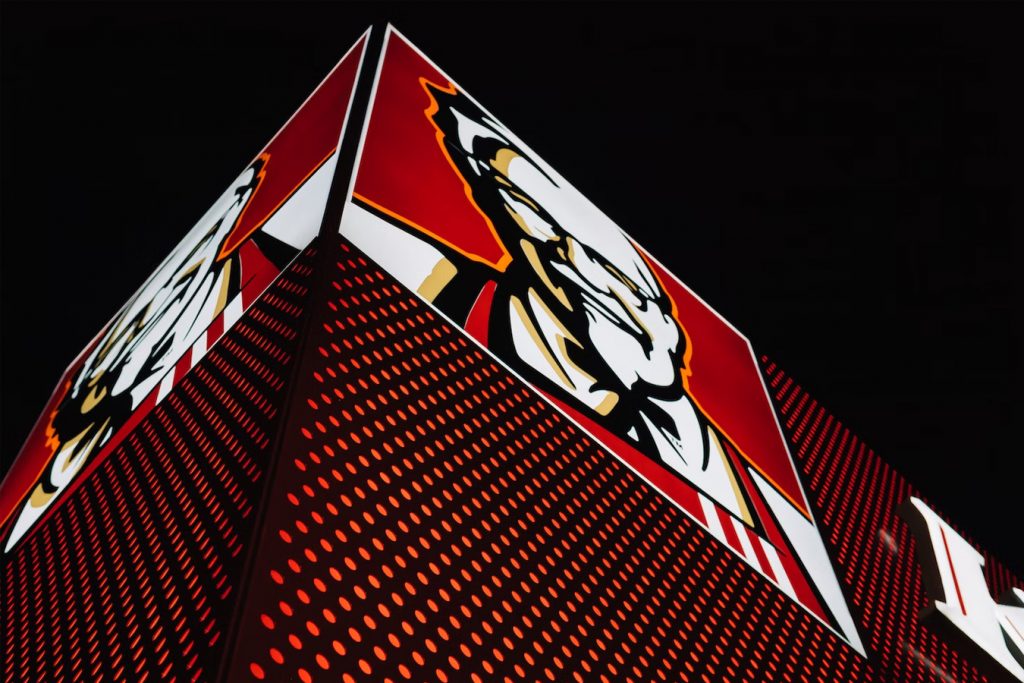
Colonel Harland David Sanders was the founder of the fast food restaurant chain KFC. His ambition and ingenuity forever changed the way Americans eat chicken. Born in Indiana in 1890, Colonel Sanders had a vision to develop a delicious fried chicken recipe that he believed would be enjoyed by all.
After experimenting with different spices, sauces and techniques, he developed his signature recipe with eleven herbs and spices that became the benchmark for all other fried chicken recipes.
The Colonel eventually opened restaurants all over the United States where people could enjoy his delicious fried chicken without having to prepare it themselves. To this day, KFC is a testament to Sanders’ powerful legacy that revolutionized the fast food industry.
He’s known for his iconic white suit, black tie and accurately trimmed mustache. But few people know that Colonel Harland David Sanders was an entrepreneur and the founding father of fast food chicken.
In his early life, he held a variety of jobs, including stoker, insurance salesman and gas station operator, before finding success in the restaurant business by opening his first Kentucky Fried Chicken restaurant at the age of 65.
Although he faced a number of obstacles along the way, Colonel Sanders’ determination and courage made him one of the most successful fast food entrepreneurs in history.
In addition to founding the popular chicken fast food restaurant KFC, Colonel Harland David Sanders was also known for developing a unique recipe for fried chicken that became KFC’s trademark.
This recipe became KFC’s signature dish and is a staple in many households around the world. The Colonel’s recipe is one of the most iconic dishes in modern history and will be enjoyed for many years to come.
Early Life & Career of Colonel Sanders
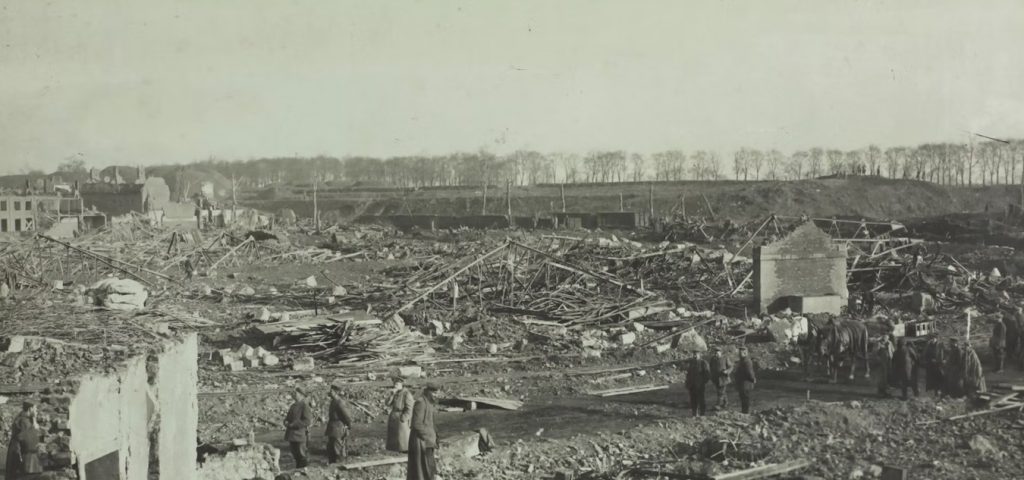
Harland David Sanders was born September 9, 1890, in a four-room house 3 miles east of Henryville, Indiana. He was the oldest of three children born to Wilbur David and Margaret Ann Sanders. His mother was of Irish and Dutch descent.
The family attended the Adventist Christian Church. His father was a gentle and loving man who farmed his 80-acre farm until he broke his leg in a fall. He then worked as a butcher in Henryville for two years.
Sanders’ mother was a devout Christian and strict educator who constantly warned her children against “the evils of alcohol, tobacco, gambling and Sunday whistling”
Sanders’ father died in 1895, leaving his mother to find work in a tomato cannery and young Harland to care for and cook for his siblings. By the age of seven, he was reportedly adept at bread and vegetables while improving at meat. In 1899, his mother remarried, and according to the 1900 census, his mother was widowed. When he was 10 years old, Sanders began working as a farm labourer.
In 1902, Sanders’ mother remarried William Broaddus, and the family moved to Greenwood, Indiana. Sanders had a stormy relationship with his stepfather. In 1903 (at age 12), he dropped out of the seventh grade (later explaining that “algebra threw me off track”) and went to work on a nearby farm.
At age 13, he left home and took a job painting horse-drawn carriages in Indianapolis. At 14, he moved to southern Indiana to work as a farm labourer.
in 1906, with his mother’s consent, he left his childhood home to live with his uncle in New Albany, Indiana. His uncle worked for the streetcar company and got Sanders a job as a conductor in 1909, Sanders married Josephine King and started a family, but after his boss fired him for insubordination on a trip, Josephine stopped writing him letters.
He then learned that Josephine had left him, given away all the furniture and household goods, and taken the children to live with their parents. Josephine’s brother wrote Sanders a letter saying, “It wasn’t right for her to marry a good-for-nothing like you who had no work.”
In 1909, Sanders found work on the Norfolk and Western Railway. He then found work as a stoker on the Illinois Central Railroad, and he moved his family to Jackson, Tennessee.
Meanwhile, Sanders studied law at La Salle Extension University by correspondence at night. After a fight with a co-worker, Sanders lost his job in Illinois. After some time, Sanders began practicing law in Little Rock for three years, earning enough money for his family to move with him.
His law career ended after he got into a fight with his own client.
Sanders then moved back to his mother’s home in Henryville and worked as a labourer on the Pennsylvania Railroad. In 1916, the family moved to Jeffersonville, where Sanders obtained a job selling life insurance with the Prudential Life Insurance Company.
Sanders was eventually discharged for insubordination. He moved to Louisville and got a job as a salesman with Mutual Benefit Life of New Jersey.
In 1920, Sanders started a ferry company that operated a riverboat between Jeffersonville and Louisville. The ferry was an immediate success.
He then got a job as secretary at the Columbus, Indiana, Chamber of Commerce. He admitted he wasn’t very good at the job and quit after less than a year.
Sanders cashed in his shares in the ferry company for $22,000 and used the money to start a business manufacturing acetylene lamps. The venture failed after Delco marketed an electric lamp that they sold on credit.
Sanders moved to Winchester, Kentucky, to work as a salesman for the Michelin Tyre Company. In 1924, Michelin closed its tyre factory, and Sanders lost his job in 1924.
He happened to meet the country manager of Standard Oil, who asked him to manage a service station in Nicholasville. In 1930, the service station closed due to the Great Depression.

In July 1939, Sanders purchased a motel in Asheville, North Carolina. His restaurant and motel in North Corbin was destroyed by fire in November 1939, and Sanders had it rebuilt as a motel with a 140-seat restaurant By July 1940 (at age 50), Sanders had completed his “secret recipe” for frying chicken in a pressure fryer, which cooked the chicken faster than pan frying.
When the United States entered World War II in December 1941, gas was rationed, and when tourism dried up, Sanders was forced to close his motel in Asheville.
He worked as a supervisor in Seattle until the end of 1942. He later managed cafeterias for the government at a Tennessee defense plant, followed by a position as assistant cafeteria manager in Oak Ridge, Tennessee.
He left his mistress, Claudia Ledington-Price, in charge of the North Corbin Restaurant and Motel. In 1942, he sold the Asheville business. in 1947, he and Josephine divorced, and Sanders married Claudia in 1949, as he had long desired. Sanders was “rehabilitated” as Kentucky’s colonel in 1950 by his friend, Governor Lawrence Wetherby.
The Rise of KFC & the “Secret” Recipe
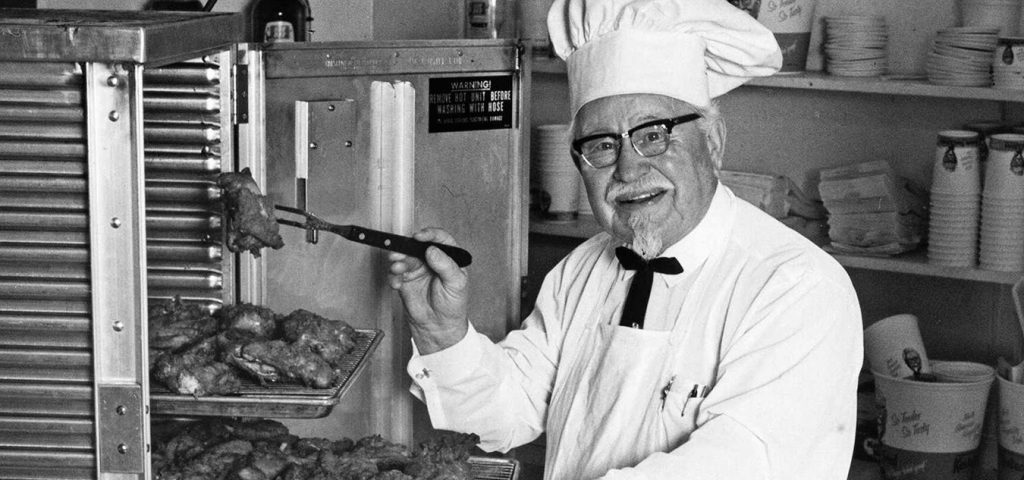
Colonel Sanders created the famous KFC chicken recipe in his own kitchen in the 1940s, beginning a culinary adventure that would last generations. After years of perfecting his own spice blend, the Colonel revealed his secret recipe to the world.
This taste sensation became a cornerstone of today’s KFC empire, and Colonel Sanders himself became a cultural icon. Thanks to this one man’s kitchen recipe, KFC has become a household name around the world.
He then set out to sell it to restaurants and eventually founded his iconic chain of fried chicken restaurants known as KFC. Colonel Harland David Sanders had a vision: he wanted to develop a delicious fried chicken recipe that the world had never seen before.
After many months of tasting and experimenting, he finally perfected his secret blend of herbs and spices. He sold the recipe to restaurant owners around the country, who were delighted with its taste.
It wasn’t long before word of the Colonel’s delicious fried chicken spread, eventually leading to the KFC empire we know today.
It’s an incredible story of determination, courage and entrepreneurship that shows us all that anything is possible when you set your mind to it.
Colonel Sanders kept the ingredients of the so-called “secret” recipe top secret, which has become one of the most valuable recipes in the world.
Moreover, Colonel Harland David Sanders is a food industry icon whose legacy will always be remembered. He developed a recipe that wasn’t only kept secret for many years, but also became one of the most valuable recipes in the world.
That this recipe has become so well known and respected is a testament to his ingenuity and focus on quality ingredients. It’s no surprise that Colonel Sanders will continue to leave a lasting mark on our culture and cuisine.
Expansion Across the Globe

In 1950, Sanders had to close his restaurant business because a new highway was being built where his restaurant was located. Colonel Sanders decided to retire and lived on $105 in Social Security checks.
He Retired at the age of 65. He felt like a failure and decided to commit suicide.
He sat there writing his will, but instead he wrote down what he would have accomplished with his life and thought about what a good cook he was.
At an age when he should have been enjoying the relaxed lifestyle of a retiree, he couldn’t live his life without purpose. He wasn’t a Harvard graduate, nor did he come from a very wealthy family, but he knew how to fry chicken that was juicy on the inside and crispy on the outside.
He took the recipe and approached many restaurants. Several hoteliers turned him down without even reading his recipe! But he didn’t lose heart. He didn’t give up his efforts.
He traveled to many cities and passed his recipe on to other hoteliers. When he was older, he climbed the steps of many restaurants. In total, there were 1,006 restaurants that he visited!
He was the embodiment of perseverance.
For two years he continued his tireless efforts and finally a hotelier showed interest in his recipe. The rest is history.
in 1952, Harland happened to meet Peter Harman, the owner of Harman’s Cafe in Salt Lake City, Utah, another popular and famous restaurant. And Peter was a shrewd businessman.
The result of that meeting was a business relationship, and Peter convinced Harland to cash his Social Security checks to start a chicken franchise based on Harland’s recipe.
In the first year of selling the product, restaurant sales more than tripled, with 75% of the increase coming from fried chicken sales.
By 1964, Colonel Sanders had more than 600 franchised outlets for his chicken in the United States and Canada. That same year, he sold his shares in the U.S. company to a group of investors for $2 million.
After selling the company, the Colonel sued Kentucky Fried Chicken for $122 million. Sanders sold Kentucky Fried Chicken in 1964, and after the food conglomerate Heublein bought the company in 1971, the cantankerous Colonel began deriding the chain’s gravy as “mush” and its owners as “a bunch of drinking buddies.”
Although he was still the public face of the company, Sanders disliked Kentucky Fried Chicken’s food so much that he developed plans to operate The Colonel’s Lady’s Dinner House restaurant, which he opened with his wife in Shelbyville, Kentucky, in 1968, as a competitor.
When Heublein threatened to block the plan, Sanders sued him for $122 million. The two sides settled out of court. Sanders received $1 million and the opportunity to teach cooking lessons to Heublein executives in exchange for a promise to stop criticizing Kentucky Fried Chicken’s food.
The restaurant, renamed the Claudia Sanders Dinner House, was allowed to remain open and is still in operation.
Today, the company he founded, Kentucky Fried Chicken, has grown into one of the largest retail food corporations in the world. Colonel Sanders, a pioneer of fast food restaurants, has become a symbol of entrepreneurship.
It’s amazing how the man has built a global fried chicken empire at age 65, when most retire. Age isn’t a barrier to success, nor is capital. What’s needed is an idea that you put into action, followed by the right planning and perseverance.
Colonel Harland Sanders’ story is inspiring because it’s an example of how perseverance, dedication and ambition, along with hard work, can lead to success regardless of age.
Colonel Sanders: A Legacy Beyond KFC
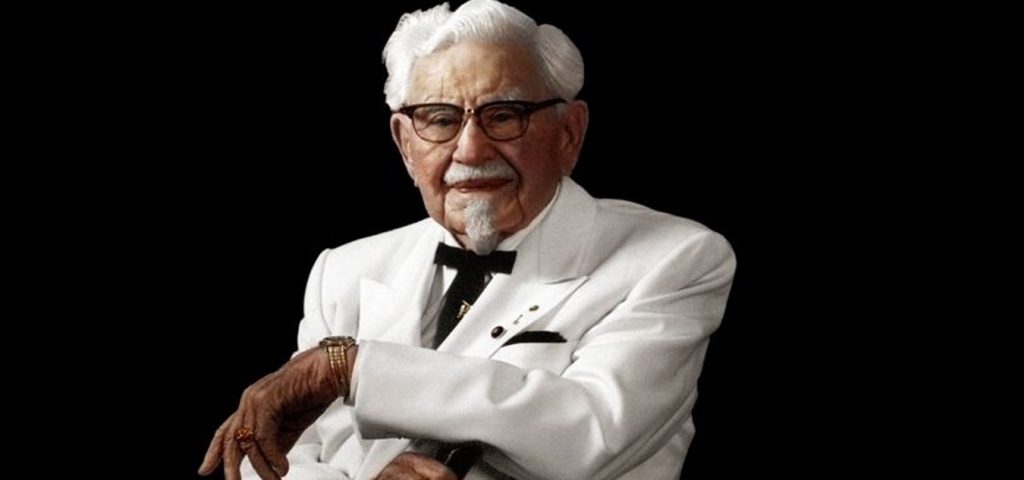
A fictionalized Colonel Sanders has repeatedly appeared as a mascot in KFC advertising and branding. Sanders has been voiced by impersonators in radio commercials, and an animated version of him, voiced by Randy Quaid, appeared in television commercials from 1998 to 2001.
In May 2015, KFC brought back the Colonel Sanders character in new television commercials, played by comedian Darrell Hammond. Some commentators found the new portrayal distasteful and disrespectful to the man’s legacy.
In August 2015, KFC launched a new campaign, this time with comedian Norm Macdonald in the role of Sanders. The campaign’s first commercial directly references the Hammond campaign, with a short clip of Hammond followed by Macdonald’s Colonel declaring his predecessor an impostor.
In February 2016, another image was introduced with Jim Gaffigan as the Colonel, who wakes up in bed and tells his wife about his recurring nightmare in which Macdonald’s Colonel “pretends to be me.”
In July 2016, George Hamilton played Colonel Sanders, who brought his famous tan to an ad for KFC’s “extra crispy” chicken
During the SummerSlam 2016 broadcast, a commercial aired featuring WWE wrestler Dolph Ziggler dressed as Colonel Sanders beating up a man in a chicken costume (played by fellow wrestler The Miz) in a ring.
In September 2016, comedian Rob Riggle played Sanders in a commercial featuring a soccer team called the Kentucky Buckets.
In January 2017, actor Billy Zane took on the role of “Solid Gold Colonel” to promote his “Georgia Gold Honey Mustard BBQ” chicken.
In April 2017, actor Rob Lowe was announced as the new performer in the role of Colonel Sanders. Lowe said he met Harland Sanders as a child.
During 2017, WWE returned to Colonel Sanders and showed commercials with Shawn Michaels and Kurt Angle playing him. It also announced that Colonel Sanders would be available as a playable character in WWE 2K18 (accessible through the “Create a Wrestler” feature) as part of a product placement deal with KFC.
Ray Liotta then portrayed Sanders. Singer Reba McEntire was named the new Sanders performer in January 2018.
As of August 2018, actor Jason Alexander and professional strongman and actor Hafþór Júlíus Bjoernsson both portray Colonel Sanders.
In early 2019, Peter Weller portrayed a RoboCop version of Colonel Sanders and later in the year, Sean Astin played a Rudy Ruettiger version of the Colonel to celebrate the start of the NFL season.
In 2019, a free-to-play video game called I Love You, Colonel Sanders! was commissioned by the KFC restaurant chain In this parody of conventional dating simulations, the player’s main goal is to establish a romantic relationship with a fictional version of KFC founder Colonel Sanders, who is portrayed as an attractive classmate at a culinary school.
In December 2020, a fictional Colonel Sanders was portrayed by Mario Lopez in the short film “A Recipe for Seduction.”
How Colonel Sanders Achieved Success

Colonel Harland David Sanders developed his famous original recipe of 11 herbs and spices to create the KFC chicken recipe that has become a staple for adventurous foodies around the world.
His iconic white suit and bow tie have become the symbol of the KFC brand and are a reminder of Colonel Sanders’ entrepreneurial spirit; an inspiration to those who want to take risks and make their own way in life.
He founded Kentucky Fried Chicken in 1930 as a roadside restaurant and his vision quickly became a worldwide phenomenon that continues today.
Colonel Sanders remains an unforgettable legend whose influence lives on in the hearts of those who take up the challenge to try his classic fried chicken.
He sold his chicken recipe to restaurant owners and made sure the taste was the same in every establishment. With that goal in mind, Colonel Harland David Sanders founded a small but mighty chicken fast food company and launched what is now known worldwide as KFC.
His commitment to the customer experience and his pursuit of high-quality chicken set the bar for what would become a staple for restaurants around the world. Colonel Sanders’ humble beginnings will live on through his creation of a chicken fast food restaurant.
He travelled across the United States to promote his product and build relationships with customers. In addition, Colonel Harland David Sanders is an inspiration to us all.
He travelled across the United States to promote the product and build relationships with customers. His passion and determination to make KFC one of the most recognised brands in the world are a testament to his success.
His story should be remembered by all of us and remind us how ambition and hard work can lead to success.
Lessons-from Sanders

1. Failure is temporary
For much of his long life, Harland Sanders was a failure. He was fired from most of the jobs he held in his 20s and 30s. He didn’t even start his first business until he was 39, an age that’s considered over-the-hill for many tech founders.
His first restaurant, started out of the back of a gas station, eventually failed and left him broke at 65.
“I just say the moral out of my life is don’t quit at age 65, may be your boat hasn’t come in yet. Mine hadn’t.”
Even with no money, the Colonel knew what to do in the face of failure: to press on. He raised some seed funding — his social security check — and drove around Kentucky, sleeping in his car, franchising his chicken recipe. Less than ten years later, at the age of 74, he sold the company for 2 million dollars.
2. Create a personal brand
Steve Jobs had his black turtleneck. Mark Zuckerberg has his hoodie. Colonel Sanders bested them both with his white suit.Sanders knew the importance of his personal brand which he started developing in 1950.
He personified his company’s brand in his own persona, as the friendly, down home Southern gentleman who was “mighty proud” for you to try his “finger lickin’ good” fried chicken.
In the last 20 years of his life, he was never seen in public without his trademark white suit and black western tie. When he died in 1980, he was buried in the suit.
When you get up in the morning, remember that what you choose to wear says a lot about who you are and what type of company you want to create. The Colonel knew this better than anyone.
“I’ve only had two rules: Do all you can and do it the best you can. It’s the only way you ever get that feeling of accomplishing something.”
3. Become an icon
Today, a majority of Americans 18 to 25 don’t know Colonel Sanders was a real person. Some didn’t even know his name when shown the logo of the company now known as “KFC”
But Harland Sanders wasn’t a made-up icon, he was a real person. He was an actual Kentucky colonel. He spent his life failing, trying again, and failing again, to finally succeed when most of us would have given up long before.
Attitude is more important than mere dry facts. Colonel Sanders has an attitude of ‘I Can’ rather ‘I can’t’.
“You got to like your work. You have got to like what you are doing, you have got to be doing something worthwhile so you can like it – because it is worthwhile, that it makes a difference.”
He built a personal brand that lives to this day. Even in the high tech world of tech start ups, there’s a lot to admire about the Colonel.
Final Say
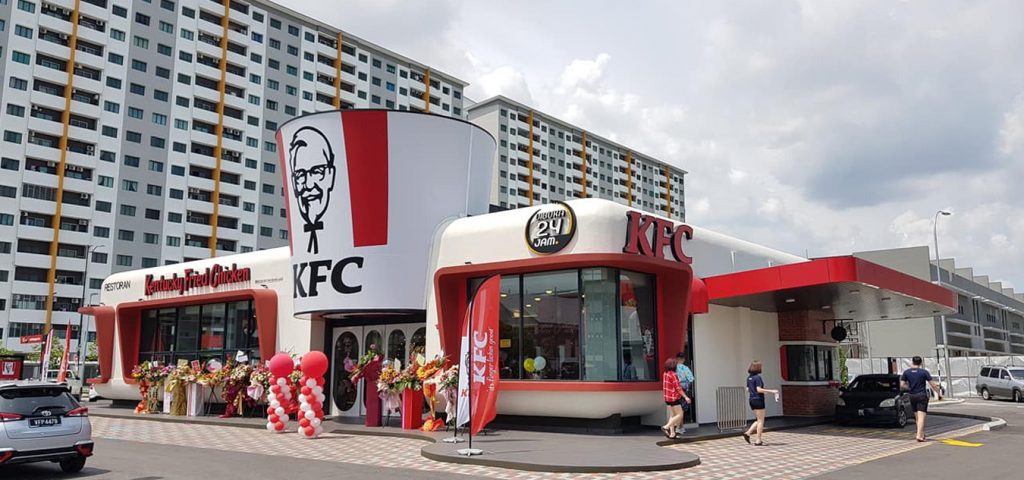
In summary, the fascinating story of Colonel Harland David Sanders is one of incredible success and determination. By following his passion, believing in himself, and striving for excellence, he managed to create a multi-billion dollar empire that continues to thrive today
But the dazzling, almost fictional character we love and cherish for his finger lickin’ good chicken was really just a young boy who cooked, dared to dream big and led an extraordinary life.
His story reminds us that success is within reach if you have the ambition and perseverance to follow your dreams, no matter where you come from.
How to Tell if You Need Professional Content Marketing Help for Your Business














